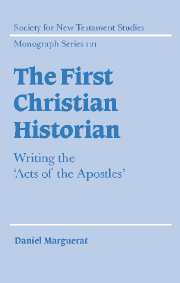Book contents
- Frontmatter
- Contents
- Preface
- 1 How Luke wrote history
- 2 A narrative of beginnings
- 3 The unity of Luke–Acts: the task of reading
- 4 A Christianity between Jerusalem and Rome
- 5 The God of Acts
- 6 The work of the Spirit
- 7 Jews and Christians in conflict
- 8 Ananias and Sapphira (Acts 5. 1–11): the original sin
- 9 Saul's conversion (Acts 9; 22; 26)
- 10 The enigma of the end of Acts (28. 16–31)
- 11 Travels and travellers
- Bibliography
- Index of passages
6 - The work of the Spirit
Published online by Cambridge University Press: 22 September 2009
- Frontmatter
- Contents
- Preface
- 1 How Luke wrote history
- 2 A narrative of beginnings
- 3 The unity of Luke–Acts: the task of reading
- 4 A Christianity between Jerusalem and Rome
- 5 The God of Acts
- 6 The work of the Spirit
- 7 Jews and Christians in conflict
- 8 Ananias and Sapphira (Acts 5. 1–11): the original sin
- 9 Saul's conversion (Acts 9; 22; 26)
- 10 The enigma of the end of Acts (28. 16–31)
- 11 Travels and travellers
- Bibliography
- Index of passages
Summary
Within the New Testament no one knew better than Luke how to recount the work of the Spirit. He has given the Spirit such central importance that Eugène Jacquier in 1926 writes: ‘The Acts are, so to speak, the Gospel of the Spirit.’ This designation, as we shall see in what follows, is only partially justified.
In saying that the work of the pneuma is unfolded here in such a central way does not necessarily mean that the rest of the New Testament is silent with regard to the Spirit. Along with the author of Luke–Acts, Paul and John are the two other New Testament theologians who develop a pneumatology. Briefly, Pauline thought situates the Spirit, on the one hand, as the foundation of faith (‘No one can say “Jesus is Lord” except by the Holy Spirit’, 1 Cor. 12. 3), and, on the other hand, as the norm for Christian existence, through ‘the law of the Spirit’ (Rom. 8). The evangelist John develops his pneumatology in the framework of the farewell speeches: the Paraclete actualizes Jesus’ teaching (14. 25–6); he reveals the Son (15. 26–7), and leads to the fullness of the truth (16. 13–15); he has a word function. In the Acts of the Apostles, we never encounter the idea that the Holy Spirit provokes faith, or that he glorifies the Son. On the other hand, Luke continually shows the Spirit taking hold of communities, directing the apostles, inciting actions, speaking, ordering, forbidding, and so on.
- Type
- Chapter
- Information
- The First Christian HistorianWriting the 'Acts of the Apostles', pp. 109 - 128Publisher: Cambridge University PressPrint publication year: 2002



